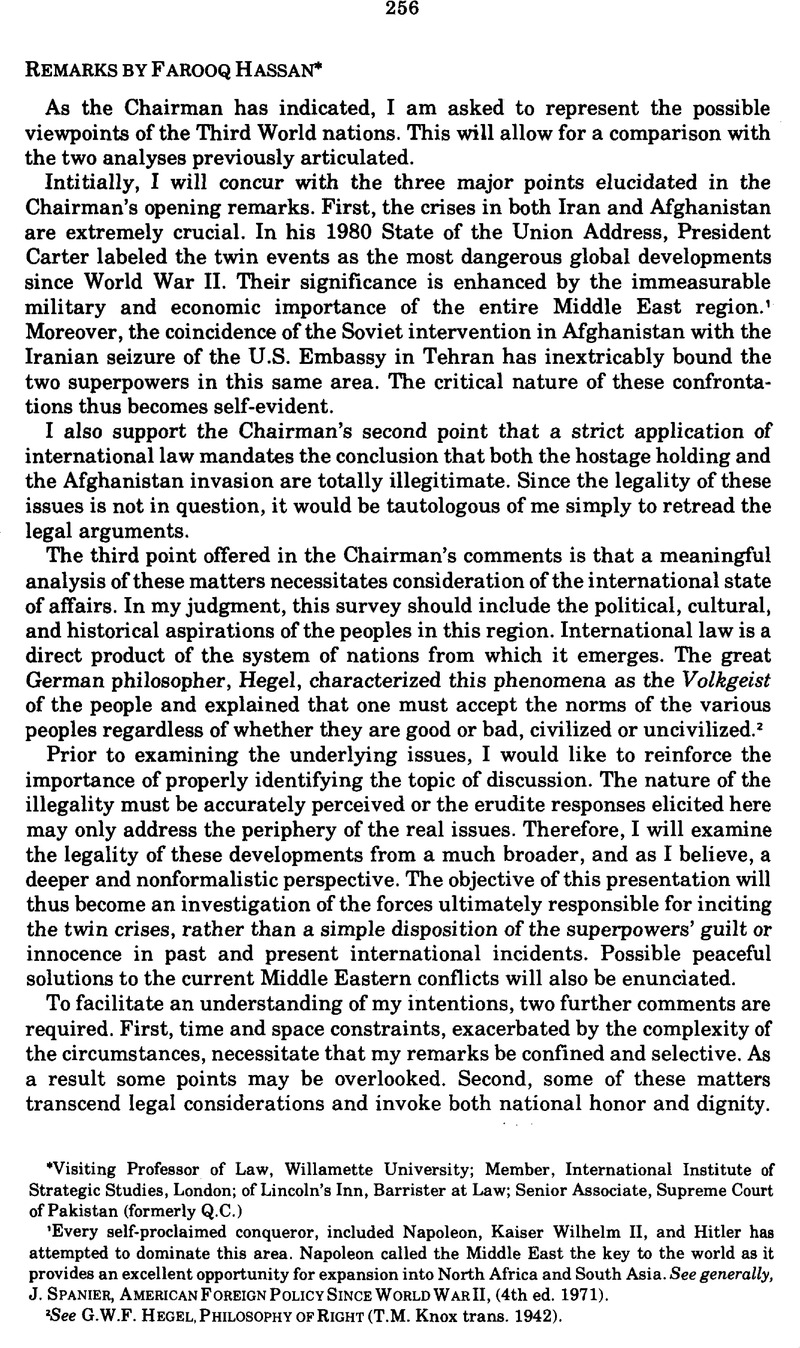No CrossRef data available.
Article contents
Remarks by Farooq Hassan
Published online by Cambridge University Press: 28 February 2017
Abstract

Information
- Type
- Legal Responses to the Afghan/Iranian Crises
- Information
- Copyright
- Copyright © American Society of International Law 1980
References
1 Every self-proclaimed conqueror, included Napoleon, Kaiser Wilhelm II, and Hitler has attempted to dominate this area. Napoleon called the Middle East the key to the world as it provides an excellent opportunity for expansion into North Africa and South Asia. See generally, J. SPANIER, AMERICAN FOREIGN POLICY SINCE WORLD WARII, (4th ed. 1971).
2 See G.W.F. HEGEL, PHILOSOPHY OF RIGHT (T.M. Knox trans. 1942).
3 Justice Holmes has stated, “(I)t is something to show that the consistency of a system requires a particular result; but it is not all. The life of the law has not been logic; it has been experience.“See O.W. HOLMES, THE COMMON LAW(1881)
4 Wars by proxy are currently employed by the superpowers within this goals concept. By pitting small nations against each other in confrontation, the Soviet Union and the United States may enhance their own political and ideological ambitions while avoiding the global annihilation likely to result from their direct belligerency.
5 See H. GROTIUS, DE JURE BELLI AC PACIS LIBRI TRES, in THE CLASSICS OF INTERNATIONAL LAW (J.B. Scott ed. 1925).
6 For example, during the Roman Empire, jus civilia was not applicable to non-Romans. Under Islamic law, there is a similar notion, although for different reasons, that it would apply only to those under the religious dictates of that particular system.
7 Security Council Resolution 457 (1979) was unanimously adopted on December 4, 1979.
8 The Soviet Union, for example, sought to justify its invasion of Hungary in 1956 under a treaty of friendship, cooperation, and mutual assistance commonly known as the Warsaw Security Pact. Soviet troops infiltrated the nation to establish a puppet government. Subsequently, the new government headed by Premier Kadar appealed for assistance. However, the assistance had arrived long before the call. See 5 WHITEMAN. DIGEST OF INTERNATIONAL LAW, 667 (1968).
9 The Security Council resolution was vetoed by the Soviet Union and the German Democratic Rebublic.
10 Iran's first Constitution was signed by Muzaffar al-Din Shah on December 6,1906.
11 The treaty was signed on Ausgust 9,1919 in London, England.
12 Seegenerally R.F. NYROP.IRAN.A COUNTBYSTUDY (1979).
13 For a thorough discussion of Iranian history see THE CAMBRIDGE HISTORY OF IRAN (W.B. Fisher ed. 1968).
14 See generally L.D. HAYNES, YEARBOOK ON INTERNATIONAL COMMUNIST AFFAIRS (1979).
15 On January 7, 1980, the draft resolution was vetoed in the Security Council. In opposition were the German Democratic Republic and the Soviet Union.
16 General Assembly Resolution ES-6/2 was adopted on January 14, 1980.
17 The writer visited Turkey, Pakistan and Kuwait, three of Iran's neighbors, for international conferences and personal professional meetings between June 16 and July 7, 1980. In view of what he heard, observed, and discussed, he wishes to add one comment to his thoughts contained in the paper. The condemnation of Soviet actions in Afghanistan was unqualified. However, whereas initially the Khomeini regime had a point to make (as the writer articulated supra) the continued detention of the U.S. diplomats for such a long time was coming to be viewed as an injustice to the United States, the families of those detained, as well as detrimental to Iran itself and to the image of Islam internationally.

